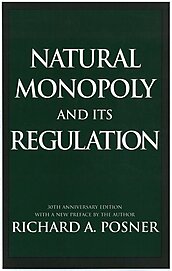Natural monopolies exist in those markets in which demand can be satisfied at lowest cost by the output of only one rather than several competing firms. Under such conditions, conventional wisdom suggests that government regulation must substitute for competition to discipline the behavior of firms. Thirty years ago a young professor named Richard Posner asked the provocative question of whether the existence of natural monopoly provides adequate justification for government intervention. His even more provocative answer was no. The evils of natural monopoly are exaggerated, the effectiveness of regulation in controlling them is highly questionable, and regulation costs a great deal. “The resources and energies of government should be directed to problems we know are substantial, that we think are traceable to government action, and that cannot be left to the private sector to work out. There are plenty of those problems, and it is doubtful that natural monopoly is among them.”
Thirty years after its initial publication, read the original insights of Richard Posner about the regulation of natural monopoly as well as a new preface in which Posner reflects on the deregulation of industries that has occurred since 1969 and the possibilities for more deregulation in the future.
